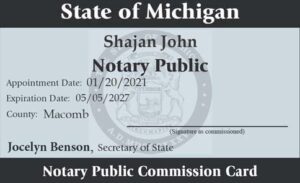
Royal Printing; Our Services are available 7 Days a Week; WALK-IN & APPOINTMENTS (Mon – Sat 9:00 am – 5:00 pm). After-hours services in the Morning: 6:00 am – 9:00 am; Evening: 5:00 pm – 9:00 pm.Appointments only for After Hours, Sundays, and Public Holiday Services. The listed prices are guaranteed. An additional charge of $50 must be paid for After Hours, Sundays, and Public Holiday Services. Tap the link for Public Holidays: https://www.michigan.gov/som/government/state-holidays .
Michigan’s Law on Notarial Acts (MiLONA), P.A. 238 of 2003, as amended, is an act to provide for the qualification, appointment, and regulation of Notary Publics (Notaries) by the Secretary of State. As such, a Notary is a public servant. The MiLONA prescribes the powers and duties of state agencies and local officers and provides for remedies and penalties. The MiLONA provides for the protection of citizens against fraud by requiring that a commissioned Notary verify and attest to the signing of documents. The MiLONA further provides for the admissibility of evidence and establishes the recognition of acknowledgments and other notarial acts performed outside of this state.
Notary Commission
A Notary Public commission is a statewide appointment. Although commissioned in a specific county, once commissioned, a Notary may notarize anywhere within the State of Michigan. Notaries copy must included:
- Notary Public: State of Michigan
- Notary Name: Exactly as commissioned
- Date of Notarization:
- County of Commission:
- Commission Expiration Date:
- Acting in the County of _______. (Included when performing a notarial act outside of the Notary’s county of commission)
Notary Signature – exactly as commissioned.
The MiLONA does not require Notaries to use an embossed seal or rubber stamp on a document. However, the use of a stamp provides for a more consistent and complete notarization.
Notarization Types
As discussed above, a commissioned Notary is authorized to perform three (3) types of notarizations.
1. Acknowledgments,
2. Administer Oaths or Affirmations (Jurat), and
3. Witness or Attest to a Signature
Note: A Notary should not decide what type of notarial act a document requires. The client must know and tell the Notary or the document itself clearly indicates what is needed. For example, the jurat indicates that the document was “sworn to before me,” then an oath must be administered.
Oath
When administering oaths, parties should raise their right hands. The left hand may be used in cases of disability. Following the oath, the signer must answer affirmatively i.e.: I do or Yes.
If no other wording is prescribed, a Notary may use the following or similar language for an affidavit or deposition:
- Do you solemnly swear that the information set forth in this document is accurate and true to the best of your knowledge and belief?
- Do you solemnly, sincerely and truly declare and affirm that the statements made by you in this document are true and correct?

We are authorized, use this link for to verify SOM – State of Michigan


